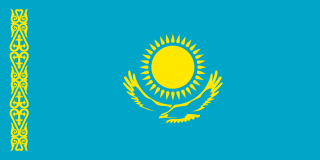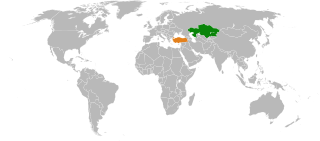
Kazakhstan, officially the Republic of Kazakhstan, is a landlocked country mostly in Central Asia, with a small part in Eastern Europe. It borders Russia to the north and west, China to the east, Kyrgyzstan to the southeast, Uzbekistan to the south, and Turkmenistan to the southwest, with a coastline along the Caspian Sea. Its capital is Astana. Kazakhstan is the world's ninth-largest country by land area and the largest landlocked country in the world. It has a population of 20 million people and one of the lowest population densities in the world, at fewer than 6 people per square kilometre. Ethnic Kazakhs constitute a majority of the population, while ethnic Russians form a significant minority. Officially secular, Kazakhstan is a Muslim-majority country, although ethnic Russians in the country form a sizeable Christian community.

The Commonwealth of Independent States (CIS) is a regional intergovernmental organization in Eurasia. It was formed following the dissolution of the Soviet Union in 1991. It covers an area of 20,368,759 km2 (7,864,422 sq mi) and has an estimated population of 239,796,010. The CIS encourages cooperation in economic, political, and military affairs and has certain powers relating to the coordination of trade, finance, lawmaking, and security, including cross-border crime prevention.

The tenge is the currency of Kazakhstan. It is divided into 100 tiyn.

The Eurasian Economic Community was a regional organisation between 2000 and 2014 which aimed for the economic integration of its member states. The organisation originated from the Commonwealth of Independent States (CIS) on 29 March 1996, with the treaty on the establishment of the Eurasian Economic Community signed on 10 October 2000 in Kazakhstan's capital Astana by Presidents Alexander Lukashenko of Belarus, Nursultan Nazarbayev of Kazakhstan, Askar Akayev of Kyrgyzstan, Vladimir Putin of Russia, and Emomali Rahmon of Tajikistan. Uzbekistan joined the community on 7 October 2005, but later withdrew on 16 October 2008.
The Kazakhstan Rugby Union is the governing body for rugby union in Kazakhstan. It is a member of the International Rugby Board.

The Kazakhstan national rugby union team, nicknamed "The Nomads", is controlled by the Kazakhstan Rugby Union. Kazakhstan have been participating in international competition since 1994 after their independence from the USSR.
The Treaty of Kulja was an unequal treaty between Qing China and the Russian Empire, signed in 1851, opening Kulja and Chuguchak to Sino-Russian trade. Prepared by the first Russian consul to China, Ivan Zakharov, the treaty was preceded by a gradual Russian advance throughout the nineteenth century into Kazakhstan in direct competition with British efforts to impose self-advantageous trade terms on China.
The Confederation of Labour of Kazakhstan (CLK) is a trade union center in Kazakhstan. It was founded March 2, 2004.
The Kyrgyzstan Federation of Trade Unions (KFTU), also known as the Federation of Trade Unions of Kyrgyzstan (FTUK) is the national trade union center of Kyrgyzstan. Most trade unions in the country are affiliated to the KFTU.
Kazakhstan Temir Zholy, also National Company Kazakhstan Temir Zholy, is the national railway company of Kazakhstan.
The Kazakhstan Billie Jean King Cup team represents Kazakhstan in the Billie Jean King Cup tennis competition and are governed by the Kazakhstan Tennis Federation. They currently compete in the Asia/Oceania Zone of Group I.

Kazakhstan–South Korea relations are the international relations between Kazakhstan and the South Korea.

Kazakh–Turkish relations are foreign relations between Kazakhstan and Turkey. Turkey recognized Kazakhstan on 16 December 1991, being the first state to recognize the independence of Kazakhstan, when Kazakhstan declared its independence. Diplomatic relations between the two countries were established on 2 March 1992. These relations have developed positively on the international stage as well as in commerce and strategic affairs. Kazakhstan has an embassy in Ankara and a consulate general in Istanbul. Turkey has an embassy in Astana and a branch office in Almaty.

Czech Republic–Kazakhstan relations are bilateral relations between the Czech Republic and Kazakhstan.
Kazakhtelecom JSC is the largest telecommunication company in Kazakhstan.

European Union–Kazakhstan relations are the international relations between the Republic of Kazakhstan and the common foreign policy and trade relations of the European Union.

The Eurasian Economic Union is an economic union of five post-Soviet states located in Eurasia. The EAEU has an integrated single market. As of 2023, it consists of 183 million people and a gross domestic product of over $2.4 trillion.

The Customs Union of the Eurasian Economic Union or EAEU Customs Union is a customs union of 5 post-Soviet states consisting of all the member states of the Eurasian Economic Union which initially became effective on January 1, 2010 at the date of implementation of the common external tariff (CET) as the Customs Union of the Eurasian Economic Community or Customs Union of Russia, Belarus and Kazakhstan. It was inherited from the Eurasian Economic Community and is now regulated by Part Two of the Treaty on the Eurasian Economic Union, EAEU Customs Code, other international agreements and by decisions of supranational bodies as Supreme Eurasian Economic Council, Intergovernmental Council and Eurasian Economic Commission.

Kazakhstan–Poland relations refer to bilateral relations between Kazakhstan and Poland. Relations focus on growing trade and politicial cooperation. Both countries are members of the Organization for Security and Co-operation in Europe, World Trade Organization and United Nations.

France–Kazakhstan relations are the diplomatic relations between France and Kazakhstan. Both nations are members of the Organization for Security and Co-operation in Europe.













